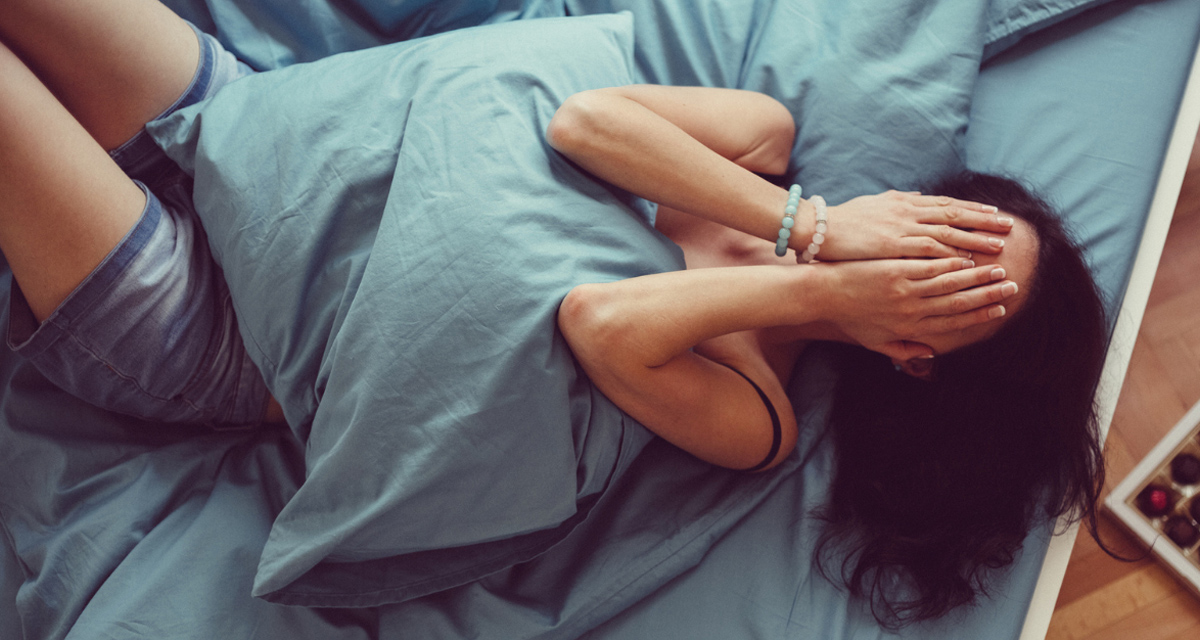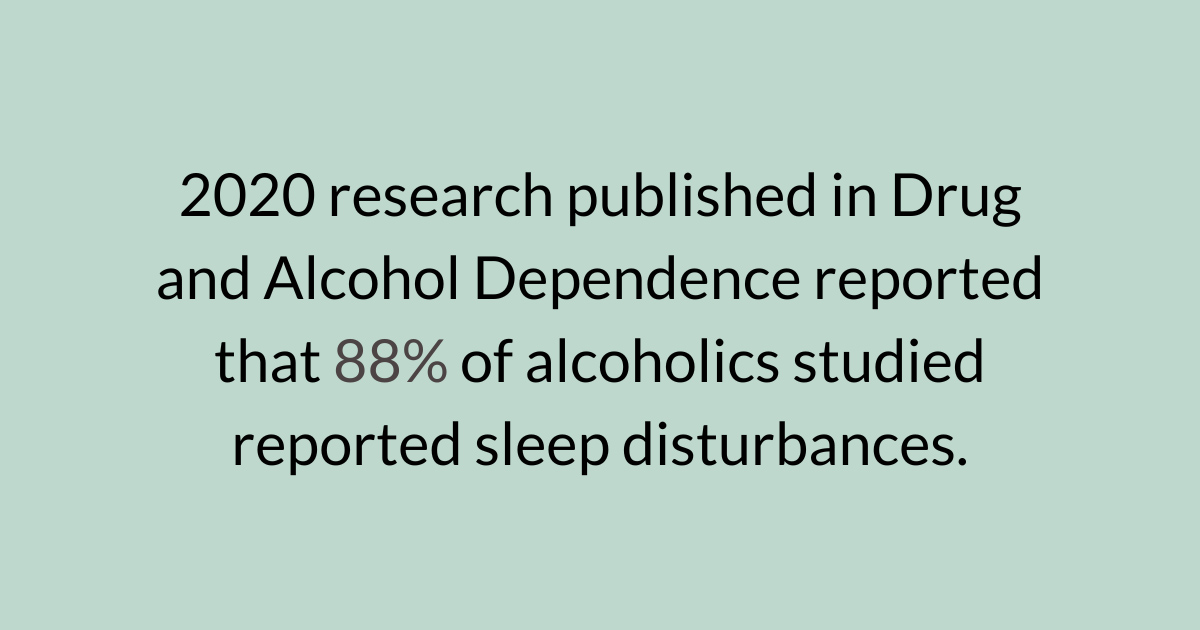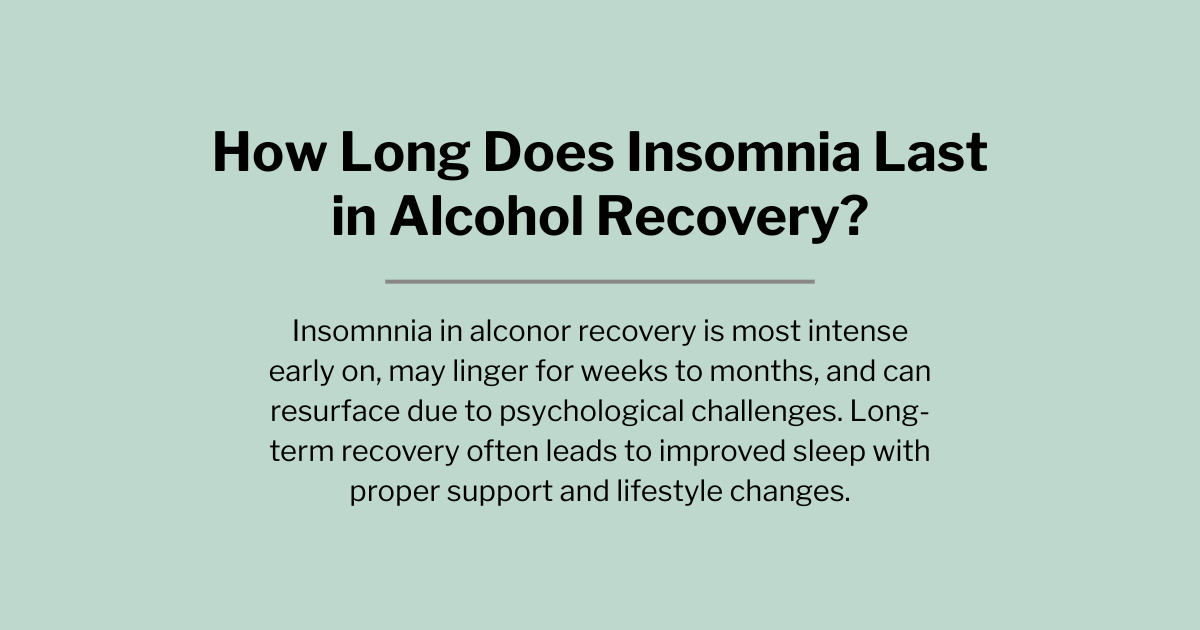
Recovery from alcoholism and other substance use disorders (SUDs) can offer life-changing benefits. Along the way, however, most people will continue to experience side effects, particularly in early recovery. Insomnia is among the most common, and many in recovery are surprised to learn that they are not alone.
Learning about the relationship between alcohol recovery and sleep can be crucial for determining how to deal with your symptoms.
What Is Insomnia?
Insomnia is a sleep disorder characterized by difficulty falling asleep, staying asleep, achieving restorative sleep, and/or requiring interventions to sleep. It is often considered a symptom of a broader physical or mental health issue. According to a study published in the Journal of Sleep Research, a person is considered to have insomnia if their sleep difficulties occur at least three times a week for at least 3 months. (Riemann et al., 2022)
Alcohol Addiction Recovery and Insomnia

Recovering from alcoholism or another SUD can be a rewarding experience, especially if the disorder caused significant hardships in your life. However, recovery can be a long and arduous road, marked by a range of symptoms and other difficulties. Insomnia is one of the most common.
In fact, insomnia in recovering alcoholics is extremely common. 2020 research published in Drug and Alcohol Dependence reported that 88% of alcoholics studied reported sleep disturbances. These were predominant during early alcohol use disorder (AUD) recovery and treatment. (Kolla et al., 2020)
Unfortunately, although it is common, insomnia in alcohol recovery can lead to further issues that may cause a recovering person to relapse. For example, since alcohol is considered a nervous system depressant with characteristics of a sedative-hypnotic – a substance with calming and sleep-inducing properties – those recovering from AUD may be tempted or choose to use alcohol to fall asleep and control their insomnia symptoms. Similarly, many people who began using alcohol as a way to fall asleep before developing AUD are at risk of relapse once insomnia resurfaces in early recovery.
Of course, even those who do not relapse still experience the negative effects of insomnia. Other problems associated with alcohol recovery and insomnia include mental health, problems with impulse control, and an overall reduced quality of life.
Why Is Insomnia Persistent in SUD and Alcohol Recovery?
Insomnia in recovering alcoholics is quite common for a number of reasons.
One or all of these may apply:
Readjustment
Alcoholism can wreak havoc on the sleep cycle in many ways, some of which are listed below. One of the primary reasons alcoholics struggle with insomnia is simple– the brain and body are attempting to readjust to a natural sleep cycle.
The Presence of Dreams and Nightmares
Many people report nightmares in the early phases of AUD recovery. These can significantly interfere with sleep quality and lead to difficulties achieving sleep.
Withdrawal
Since those with AUD become reliant on the presence of alcohol to not only fall asleep but also function in general, the removal of alcohol can lead to new symptoms as the brain and body attempt to function without it. During withdrawals, those recovering from AUD may experience sweating, shaking, anxiety, and irritability, which can make it difficult to fall and stay asleep.
Rebound Insomnia
Often associated with withdrawal symptoms, rebound insomnia can occur when alcohol is eliminated. The brain’s neurotransmitters, which have become accustomed to the sedative effects of alcohol, may become overactive when it is removed. Many of the brain and body processes controlled by neurotransmitters can ramp up, causing difficulty falling and staying asleep.
Inadequate or Poor Sleep Hygiene
Sleep hygiene refers to the habits we practice that promote quality, restful sleep. These habits include sleep environment, sleep schedule (or a lack thereof), exercise schedules, stress, and other factors. One of the most important factors is napping during the day, which can impact sleep at night; napping is common in recovering alcoholics, as the withdrawal process can be emotionally, mentally, and physically taxing.
How Long Does Insomnia Last in Alcohol Recovery?

Before understanding how long insomnia may persist during AUD recovery, it is important to understand the phases of AUD recovery. Each phase is different and brings about a variety of changes and adjustments as individuals work to heal from alcohol dependence.
The phases include:
Acute Phase
The acute phase is the first phase of recovery and may also be referred to as the withdrawal phase. In this phase, the recovering person detoxes from alcohol and may experience the most intense withdrawal symptoms. For this reason, acute recovery is often medically supervised and lasts for the first few days to weeks of recovery.
Insomnia tends to be most common in the acute phase of alcohol recovery and can persist for the entirety of this phase. Moreover, insomnia may be the most intense during this phase because of withdrawal symptoms and the tendency for providers to avoid prescribing sleep medication during acute recovery.
Subacute or Repair Phase
The subacute phase occurs immediately after the acute phase, and refers to a time in which the body has detoxified from alcohol and intense withdrawal symptoms have subsided. In this phase, the person with AUD takes an active role in their recovery and focuses on coping mechanisms. Meanwhile, they must actively abstain from alcohol, manage cravings, build support systems, repair relationships, and manage lingering psychological issues. This phase can last anywhere from several weeks to 1-2 years.
During the subacute phase, sleep problems may improve but may not completely go away. Insomnia could last for several weeks, though this largely depends on the nature of the alcohol addiction as well as the person in recovery’s ability to manage their symptoms.
Post-Acute Phase
This phase tends to be more psychological than physical, as those recovering from AUD may experience post-acute withdrawal syndrome (PAWS), which may be marked by depression, anxiety, fatigue, mood swings, cravings, and sleep issues. For this reason, emphasis is placed on those recovering to focus on managing their mental health to prevent relapse.
While in the post-acute phase, especially if the person in recovery experiences PAWS, individuals may find that their sleep disturbances return. At this time, insomnia may be due to other issues like anxiety or depression.
Long-Term Recovery
Long-term recovery is typically associated with sobriety, minimal cravings, and sustained efforts to maintain abstinence. In this phase, people recovering from AUD may benefit from 12-step programs and other community-based groups to help them maintain their sobriety. Continuous focus on mental health is also common in this phase, as is a dedication to making lifestyle changes such as exercising, eating healthy foods, prioritizing other forms of self-care, and fostering healthy relationships.
In some cases, insomnia can continue throughout the recovery process, lasting for years if left untreated.
How long insomnia lasts depends on a range of factors:
- Severity of Alcohol Dependence – The severity of a person’s alcohol dependence is a strong indicator of whether they may experience insomnia and for how long. Generally, the heavier the alcohol usage, the more prolonged the insomnia in recovering alcoholics can be, though each case is different.
- Biological Differences – Another factor that contributes to the length of time insomnia may last is the biological makeup of the person recovering. Our bodies are different, and some people are more predisposed to sleep disturbances than others.
- Comorbid Disorders – If there is a comorbid disorder present, insomnia may last longer. For example, mental health disorders like anxiety or depression, and even physical health issues, can cause insomnia to last longer.
Medication-Based Alcohol Insomnia Treatment
If you struggle with insomnia during AUD or SUD recovery, you may be wondering how to treat it in order to improve your chances of long-term recovery and a happy and healthy life. There are a few forms of approved treatment for alcohol recovery-related insomnia, and knowing what works for you can improve your chances of avoiding relapse and other problems associated with insomnia. Medication has proven to be an effective treatment for insomnia in patients recovering from alcohol use disorder or SUD.
The most commonly prescribed medications used to treat insomnia include tranquilizers, sedatives, and synthetic hormones like melatonin. Antidepressants are typically the first-choice therapy prescribed for insomnia, per a 2003 NIH study (Friedmann et al., 2003). Specifically, trazodone was the most prescribed, followed by amitriptyline.
Antihistamines, which are typically used to treat allergies, may also be recommended to help with insomnia. Both over-the-counter and prescription antihistamines can be effective, as they have sedative effects in addition to blocking histamine receptors.
Tips for Dealing With Alcohol Insomnia

Sometimes, you are your best resource for dealing with alcohol insomnia. Certain practical changes may help you achieve quality sleep, thereby improving your chances of recovering from AUD. This is especially true if you are concerned that sleep medication may lead to relapse.
The following are tips for dealing with alcohol insomnia:
Create a Consistent and Effective Sleep Routine
Creating a sleep routine is one of the first steps you should take in order to get the rest you need at night. Going to bed and waking up at the same time each day can train your body to sleep well. Additionally, developing healthy sleep rituals can help with your routine, such as playing relaxing music, practicing deep breathing, taking a bath, reading, or engaging in other relaxing activities.
Focus on Your Environment
Your environment plays a crucial role in determining how well you sleep and whether you wake up during the night. Generally, it is advised to sleep in a dark and cool place, as these conditions signal to your body that it is time to sleep and prevent waking due to intrusive light or overheating. Investing in a comfortable mattress and pillows can also promote restful sleep.
Avoid Stimulants Before Bed
Consuming stimulants like caffeine and nicotine too close to bedtime can inhibit your ability to fall asleep and remain asleep. This is why it is recommended to avoid coffee in the afternoon and evening. Also, consider eliminating stimulating materials, like phones, televisions, and other blue light-emitting devices, from your sleeping area to enable your brain and body to wind down before sleep.
Exercise During the Day
Exercise and physical activity offer numerous health benefits, including improved sleep quality. Among the many other benefits listed by a 2023 Cureus review, physical exercise increases melatonin production, relieves stress, and regulates body temperature, all of which are factors that contribute to adequate sleep. (Alnawwar, 2023) Avoid exercising at night, as overstimulation in the evening can be counterproductive to establishing a healthy sleep routine.
Avoid Alcohol and Its Substitutes
It may be tempting to consume alcohol or other substances to help you sleep during recovery. However, even a small amount can trigger a relapse and delay any advances you may have made in your recovery process. If you do require medication or you are finding it difficult to treat your insomnia without alcohol, it’s time to consult with a professional.
Seek Professional Alcohol Recovery Help at Maryland Recovery

Alcohol insomnia not only interferes with your daily life, but it can also significantly impact your ability to maintain your sobriety. Just as a lack of restful, adequate sleep can lead to difficulty concentrating, focusing, or making decisions, it can also weaken your resolve and your determination to abstain from alcohol. If you’ve previously used alcohol to overcome insomnia, it can be even more tempting to return to a substance that previously enabled you to fall asleep.
If you’re experiencing insomnia brought about by alcoholism, consider consulting with a professional to help with your alcohol insomnia treatment as you recover from AUD. Maryland Recovery is ready to help you on your road to alcohol recovery, including identifying resources that may be able to alleviate your insomnia symptoms so you can focus on recovery and take measures to achieve more restful sleep.
To learn more about how we can serve you, contact our compassionate team to schedule a consultation.
*Editor’s Note: This article was originally published in 2014 and has been updated July 21, 2025.
Sources:
- Lunsford-Avery, J. R., Engelhard, M. M., Navar, A. M., & Kollins, S. H. (2021). Validation of the sleep regularity index in older adults and associations with cardiometabolic risk. Journal of Sleep Research, 30(3), e13604. https://doi.org/10.1111/jsr.13604
- Baggio, S., Iglesias, K., Achab, S., Studer, J., & Gmel, G. (2019). Is regular cannabis use associated with sleep impairment in young adults? Drug and Alcohol Dependence, 200, 48–53. https://www.sciencedirect.com/science/article/abs/pii/S0376871619304326
- Roehrs, T., & Roth, T. (2001). Sleep, sleepiness, and alcohol use. Alcohol Research & Health, 25(2), 101–109. https://www.ncbi.nlm.nih.gov/pmc/articles/PMC2761628/
- Scott, C. M., & Markwald, R. R. (2023). Sleep and substance use: Bidirectional relationships and associated health outcomes. Substance Abuse: Research and Treatment, 17, 1–12. https://www.ncbi.nlm.nih.gov/pmc/articles/PMC10503965/
- National Academies of Sciences, Engineering, and Medicine. (2017). Pain management and the opioid epidemic: Balancing societal and individual benefits and risks of prescription opioid use. National Academies Press. https://www.ncbi.nlm.nih.gov/books/NBK441882/
- Freeman, D., Sheaves, B., Waite, F., Harvey, A. G., & Harrison, P. J. (2020). Sleep disturbance and psychiatric disorders. The Lancet Psychiatry, 7(7), 628–637. https://www.ncbi.nlm.nih.gov/pmc/articles/PMC7486899/
- Malhotra, A., Kryger, M., & Roth, T. (2023). Sleep and addiction: Interactions and treatment implications. Sleep Health, 9(1), 8–17. https://www.ncbi.nlm.nih.gov/pmc/articles/PMC9798382/
- National Institute on Alcohol Abuse and Alcoholism. (n.d.). Alcohol use disorder: Risk, diagnosis, and recovery. Retrieved March 27, 2025, from https://www.niaaa.nih.gov/health-professionals-communities/core-resource-on-alcohol/alcohol-use-disorder-risk-diagnosis-recovery

A solution focused therapist with over a decade in the helping services, I am attuned to the broad expanse of holistic recovery. My mission is inspired by the work of Joseph Campbell, Dr. Wayne Dyer, and Fr. Joseph Martin. I am well versed in the specific needs of the recovery community and am trained in EMDR.








